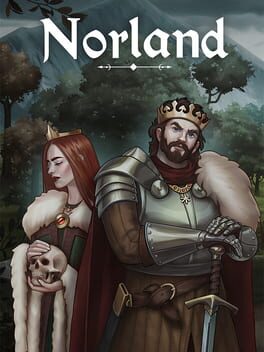jobosno
BACKER
Recent Activity
6 hrs ago
6 hrs ago
jobosno
commented on
curse's
review of
Ico

i would honestly have more respect for IGDB's weird ass processes if they just openly said "yeah we just run on vibes"
7 hrs ago
10 hrs ago
10 hrs ago
10 hrs ago
10 hrs ago
10 hrs ago
jobosno
reviewed
Norland
Wrote this off as a Rimworld overhaul mod masquerading as a full game upon viewing its store page, and I was wrong to do so. It certainly aspires to be more and often succeeds, taking the structure of a colony sim with its small populations and limited direct control and using it to create a miniature feudal state. This focus allows for a relatively graceful implementation of systems these games tend to struggle with: warfare, nobility, and that little gap between the personal relationships of your leaders and "official" diplomacy.
Despite its visual presentation skewing closer to Rimworld, the gameplay you're getting is more Ratopia than anything else, asking you to juggle survival, morale, and a primitive economy to create a healthy medieval ecosystem. The attention each lord requires keeps the player busy even if you're only managing 2-3 of them, and the existence of a larger, uncontrollable peasant class makes the game feel sufficiently populated without turning the whole affair into a micromanagement nightmare. The latter do a lot of the heavy lifting in making your settlement feel like a proper community as you watch them filter through the rest of the settlement to meet their own emotional and economic needs once the workday is over. In a move that logically follows but is surprisingly rare in these games, the peasants are very relevant to the wellbeing of your settlement - even in small groups - and it means that players must always be ready to dedicate some attention to placating them.
All this being said, I have a hard time mustering up the enthusiasm to play this thing. I'm not too crazy about combat in any game of this sort and creating/equipping squads in this game is a chore, and not a fun one. There is "depth" in that this system lets you click a lot of things, but it never feels like you're making meaningful decisions. In some ways it's a victim of the decision to relegate the peasants to the background for so much of the experience, as evidenced by the fact that the very similar squad-building mechanics in Dwarf Fortress can feel much more meaningful since each colonist has the texture of a "real person" for the entire game: in DF you can go out of your way to form squads solely comprising elvish warrior poets, or monster hybrids, or former soapmakers, and in Norland I don't feel like picking and equipping people for my squad has the same importance to it.
I also feel like the aesthetic similarities to Rimworld create expectations about its priorities, and Norland focuses a bit more on interpersonal relationships/medieval statecraft than it does the city-builder elements. This focus is especially felt in the early game when you've only got a few buildings unlocked and are likely to really feel the absence of one of your lords as you send them to go hunting off-screen with a neighboring ruler - an act which effectively obliterates that character until they return. The amount of lords you have gates the amount of building that you can do, since each productive building needs to be issued orders by a lord every couple days. This requirement starts to feel punitive as your lords will be stretched thin with other tasks (which they will ignore in favor of doing sweet fuck-all, but they're nobility after all), so if your favorite part of these games is all the stuff you get to plan and build upon starting a new game then you may not be happy with how much restraint you have to show with this one.
Lastly, despite the fact that the game revolves pretty heavily around the lords and their ability to slot things into their schedule, managing them can get really tedious depending on how much you care about their mood. Managing their emotional state (especially as it pertains to relationships) can require a lot of player action if you get unlucky, and it's not a terribly interesting thing to engage in as a player. The economic and management side of the game gives you elements you have to consider when assigning managers and making similar choices, but if you're sending your nobles off to improve their relationship then you're essentially just pressing a button to make a bar go up when it gets too low, because there's not much to think about when picking an outing and not much in the way of feedback for taking that kind of action.
I think Norland has some really solid selling points despite being an early access game, but in order for those elements to truly shine the developer needs to be willing to revisit existing systems instead of simply building on top of what's here. So much of the game is currently filtered through the lords that they alone are going to require tremendous scrutiny any time part of the game changes. Most of the negative reviews on Steam at the moment mention the lords, because it's very easy to hit the cap of 5 and they're not very capable of generating the kind of stories you would expect from a game that places so much focus on such a small group of them. I feel like I say that "there's potential" in all my reviews of Early Access titles, but in Norland it feels undeniable - it's good at simulating a small feudal community and its class structure, it has unique management and economic systems for a game in its genre, and with some tuning the combat and diplomacy could become best-in-class for a colony sim. I've spoken harshly, but there are no fundamental flaws. It's just not there yet. And while I'm a skeptic at heart and am fully expecting to have the same criticisms when this game hits 1.0, I'd love it if my grumpy ass is writing a review for some other game a couple years from now, telling people that "I'd rather be playing Norland instead".
Despite its visual presentation skewing closer to Rimworld, the gameplay you're getting is more Ratopia than anything else, asking you to juggle survival, morale, and a primitive economy to create a healthy medieval ecosystem. The attention each lord requires keeps the player busy even if you're only managing 2-3 of them, and the existence of a larger, uncontrollable peasant class makes the game feel sufficiently populated without turning the whole affair into a micromanagement nightmare. The latter do a lot of the heavy lifting in making your settlement feel like a proper community as you watch them filter through the rest of the settlement to meet their own emotional and economic needs once the workday is over. In a move that logically follows but is surprisingly rare in these games, the peasants are very relevant to the wellbeing of your settlement - even in small groups - and it means that players must always be ready to dedicate some attention to placating them.
All this being said, I have a hard time mustering up the enthusiasm to play this thing. I'm not too crazy about combat in any game of this sort and creating/equipping squads in this game is a chore, and not a fun one. There is "depth" in that this system lets you click a lot of things, but it never feels like you're making meaningful decisions. In some ways it's a victim of the decision to relegate the peasants to the background for so much of the experience, as evidenced by the fact that the very similar squad-building mechanics in Dwarf Fortress can feel much more meaningful since each colonist has the texture of a "real person" for the entire game: in DF you can go out of your way to form squads solely comprising elvish warrior poets, or monster hybrids, or former soapmakers, and in Norland I don't feel like picking and equipping people for my squad has the same importance to it.
I also feel like the aesthetic similarities to Rimworld create expectations about its priorities, and Norland focuses a bit more on interpersonal relationships/medieval statecraft than it does the city-builder elements. This focus is especially felt in the early game when you've only got a few buildings unlocked and are likely to really feel the absence of one of your lords as you send them to go hunting off-screen with a neighboring ruler - an act which effectively obliterates that character until they return. The amount of lords you have gates the amount of building that you can do, since each productive building needs to be issued orders by a lord every couple days. This requirement starts to feel punitive as your lords will be stretched thin with other tasks (which they will ignore in favor of doing sweet fuck-all, but they're nobility after all), so if your favorite part of these games is all the stuff you get to plan and build upon starting a new game then you may not be happy with how much restraint you have to show with this one.
Lastly, despite the fact that the game revolves pretty heavily around the lords and their ability to slot things into their schedule, managing them can get really tedious depending on how much you care about their mood. Managing their emotional state (especially as it pertains to relationships) can require a lot of player action if you get unlucky, and it's not a terribly interesting thing to engage in as a player. The economic and management side of the game gives you elements you have to consider when assigning managers and making similar choices, but if you're sending your nobles off to improve their relationship then you're essentially just pressing a button to make a bar go up when it gets too low, because there's not much to think about when picking an outing and not much in the way of feedback for taking that kind of action.
I think Norland has some really solid selling points despite being an early access game, but in order for those elements to truly shine the developer needs to be willing to revisit existing systems instead of simply building on top of what's here. So much of the game is currently filtered through the lords that they alone are going to require tremendous scrutiny any time part of the game changes. Most of the negative reviews on Steam at the moment mention the lords, because it's very easy to hit the cap of 5 and they're not very capable of generating the kind of stories you would expect from a game that places so much focus on such a small group of them. I feel like I say that "there's potential" in all my reviews of Early Access titles, but in Norland it feels undeniable - it's good at simulating a small feudal community and its class structure, it has unique management and economic systems for a game in its genre, and with some tuning the combat and diplomacy could become best-in-class for a colony sim. I've spoken harshly, but there are no fundamental flaws. It's just not there yet. And while I'm a skeptic at heart and am fully expecting to have the same criticisms when this game hits 1.0, I'd love it if my grumpy ass is writing a review for some other game a couple years from now, telling people that "I'd rather be playing Norland instead".
1 day ago
2 days ago
2 days ago
2 days ago
2 days ago
